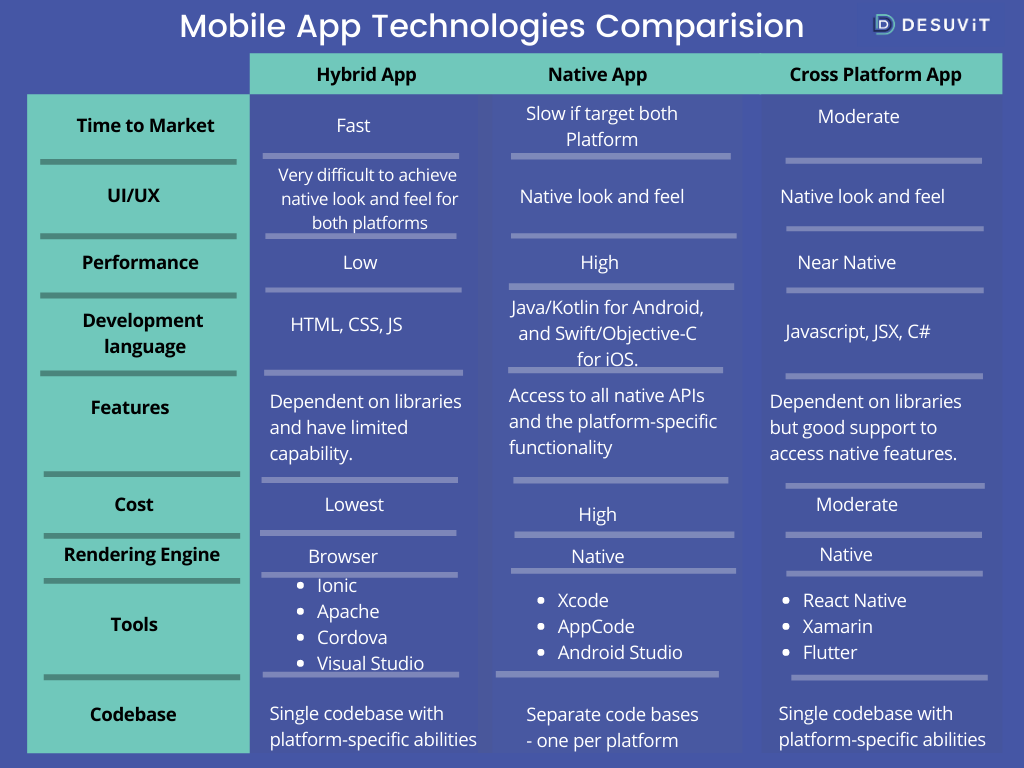Today, more and more people are using mobile apps as they are easy to use, have features which are not available on the web and can either earn money by generating new revenue streams for the business or save money. No doubt why more and more businesses are embracing mobile first solutions for their business.
But the road is not easy as it takes lots of analysis, planning and execution effort to bring the mobile app live. You need to understand what development process to follow so to get best results. You must know exactly what it takes to execute and what technologies are available in the market today.Choosing a wrong technology might make or break your mobile app development. We help you decide what technology is available and what they offer.
Broadly, the mobile development technologies can be divided into three categories, Hybrid apps, Native Apps and Cross platform Apps. Any of the three approaches can be a good fit depending on the kind of app you want to develop, target audience, budget, native features etc.
Let us dive deeper into three categories to see what they have to offer:
Hybrid Apps
A hybrid app is developed as a single app but can be used on multiple platforms like Android, iPhone, and Windows. They are written using standard web technologies (HTML5, CSS, JavaScript) and uses webview for rendering the app. Hybrid apps talk to the underlying platform using a native wrapper and leverage the device’s browser engine (but not the browser) to render the HTML and process the JavaScript locally.
Since hybrid apps are built using standard web technologies they can be developed quickly and works on all the platforms. The downside is performance and non-native look and feel. The most popular Hybrid app platforms today are.
Native App
Native apps are built specifically for only one platform; thus, the applied technologies will differ. To handle the development of Android mobile apps, the engineers can apply Java or Kotlin. For iOS development, Swift or Objective-C programming language will be used.
Since the two platforms are separate, code bases cannot be shared with each other. Which means the development process will take longer, and the app will need to be developed separately on each platform. Since the app will be using the native libraries and platform, the functionality is only limited by the platform. The app will be more responsive and have better performance and native user experience.
Cross-Platform App Development
The complexities of developing native apps and developing for both the platforms has a huge cost associated with the mobile app development. Not all the apps require the native features and do not need best performance offered by the native platform. Cross platform apps give the native look and feel of the app (which is hard to get in the hybrid app) and offers good performance (much better than hybrid apps and quite close to the native app).
The Cross-Platform development approach uses a native rendering engine. The codebase written in JavaScript/JSX/C# etc. connects to native components via the so-called bridges. This provides the close-to-native UX. Cross-platform apps are free of platform hook, so they offer seamless functionality, easy implementation, and cost-effective production. The most popular platforms today to build the cross platform apps are
Hybrid vs. Native vs. Cross-Platform Infographic
The debate surrounding which app type is best is still very relevant today as the lines between the three approaches are becoming increasingly blurred. While the discussion to differentiate the three mobile apps continues, it is important to remember that you should not choose an approach for the technology, but instead, choose based on what you want your app to do. If you choose a wrong approach that does not allow your app to utilize device features, for example, then you will end up wasting a lot of time and money when you decide to add features.
The choice between Native, Hybrid and Cross Platform App development is dependent on specific features and several factors, including business needs, app requirements, developer skill, and timelines. The bottom line is that each type of app offers an entirely different experience, and it is important to know the strengths and weaknesses of each before jumping into development.

Both ways of using technology can be helpful in certain circumstances and depending on your business needs.
Summing up
To have a balance between features, time to market and cost of development of the mobile app, it is important to choose the right technology for your mobile app development.
We at Desuvit have experience working on different mobile development technologies. Having developed many mobile apps on different technologies, our experience is that cross-platform apps (using React Native/ Xamarin) offer the best possible solution in terms of platform specific UI and close to native apps performance. Having about 70%-80% of the common code-base helps keep the cost in check for apps targeting both major iOS and android platforms.
Are you in need of a reliable mobile app development company to cater to your needs? At Desuvit, you will find expert team of mobile app developers with years of experience in the field.
Reach out to us and let us kickstart your mobile app development journey. Let us build something exceptional, together!
Desuvit is a Norway-born software development company delivering Custom Software Development, Mobile Apps, and Web Applications Development for various verticals and business domains. We offer end-to-end solutions for companies with no software or IT division, Startups, and companies that need to scale their software development efforts but lack the expertise required. We help our clients in growing their businesses so we can grow with them. Some of the technologies we work with: .Net, Azure, Microservices, Azure functions(Serverless computing), React Native, Flutter, React JS, TypeScript, Angular, NServiceBus, Azure Service Bus, Azure Queues, SQL Service, MySQL, Cosmos DB, etc.
Enjoyed this article? Subscribe for more valuable and great content !
By subscribing, you agree with our privacy policy and our terms of service.





